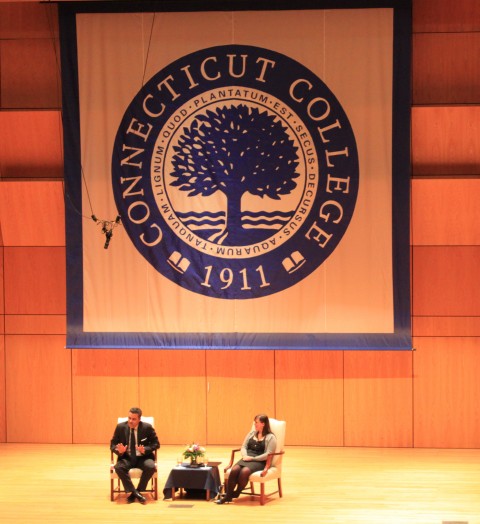Last Friday, April 1, Connecticut College hosted Jon McBride ’92, the second speaker in the school’s centennial speaker series. McBride, current Deputy Director of Presidential Personnel to Barack Obama, entered to a round of applause from the student body and took his seat across from Alex Shapiro ’11, showing a surprising connection with the young crowd and answered all questions with refreshing honesty.
McBride graduated in 1992, after majoring in economics, before moving on to the University of Pennsylvania’s Wharton School, where he earned his MBA. He spent a period of time working for investment bank Goldman Sachs, eventually leaving the bank to start his own business.
Through the economic crisis, McBride’s business was able to “stay afloat, although just barely.” Still, he was most appreciative of the lessons he learned running his own company.
“Suddenly, you have a number of employees looking at you, expecting you to have the answers,” said McBride. “It was more about taking a chance than anything.”
His consistent references to taking chances and seizing opportunity became a theme throughout the night. “You can be the person standing on the side who says, ‘Oh, there is a problem,’” he said, “ or you can be the one who walks over and solves it.”
In August 2008, McBride accepted a job as head of Presidential Personnel, a position intended to attract the best and the brightest to the White House. “Your time with President Obama is extremely precious,” said McBride. “You definitely want to get it right with him.”
Although he described himself as a less than diligent student while at Connecticut College, McBride cited the President’s powerful intelligence as motivation to persevere in his own work. He told us stories of President Obama: The Family Man and President Obama: The Basketball Coach, a pleasant reminder of the humanity of our commander in chief.
Although the focus of the talk was clearly meant to be on his current job at the White House, McBride was not stingy with his larger life lessons. He described Connecticut College as the perfect opportunity to prepare oneself for the real world. “It allows you to take risks when the stakes are low.”
He cited Connecticut College as the foundation of what he called his “nonsensical career.”
“The key,” he said, “is to just make a decision and start. Your only responsibility is to dare to be dissatisfied.”
“A liberal arts education does not prepare you for your first job,” he admitted. However, he was sure to emphasize just how important he thought his education had been in guiding him on his winding journey to success.
He ended with a few paraphrased words from his boss: “You’ve got to go out and do it for yourself. Individual salvation lies in group salvation. Make sure to hitch your wagon to something bigger.” •










